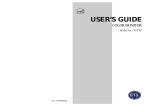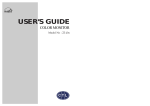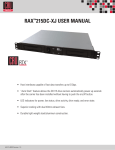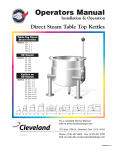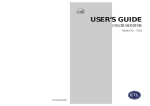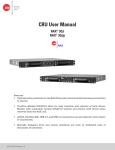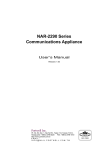Download Computer Tech Link 7dln User's Manual
Transcript
USER’S GUIDE COLOR MONITOR Model No : 7 d l n CTL S/N : 9978628208 IMPORTANT SAFEGUARDS 1. Read all of these instructions. 2. Save these instructions for later use. 3. Unplug this monitor from the wall outlet before cleaning. Do not use liquid cleaners or aerosol cleaners. Use a damp cloth for cleaning. 4. Do not use attachments not recommended by the monitor manufacturer as they may cause hazards. 5. Do not use this monitor near water, e.g., near a bathtub, washbowl, kitchen sink, or laundry tub, in a wet basement, or near a swimming pool, etc. 6. Do not place this monitor on an unstable cart, stand, or table. The monitor may fall, causing serious injury to a child or adult, and serious damage to the appliance. 7. Slots and openings in the cabinet and the back or bottom are provided for ventilation, to ensure reliable operation of the monitor, and to protect it from overheating. These openings must not be blocked or covered. The openings should never be blocked by placing the monitor on a bed, sofa, rug, or other similar surface. This monitor should never be placed near or over a radiator or heat register. This monitor should not be placed in a built-in installation such as a bookcase unless proper ventilation is provided. 8. This monitor should be operated only from the type of power source indicated on the marking label. If you are not sure of the power supplied to your home, consult your monitor dealer or local power company. 9. This monitor is equipped with a 3-wire grounding-type plug, That is, a plug having a third (grounding) pin. This plug will only fit into a grounding-type power outlet. This is a safety feature. If you are unable to insert the plug into the outlet, contact your electrician to replace your obsolete outlet. Do not defeat the purpose of the grounding-type plug. 10. Do not allow anything to rest on the power cord. Do not locate this monitor where the cord will be abused by people walking on it. 11. Follow all warnings and instructions marked on the monitor. 12. For added protection for this monitor during a lightning storm, or when it is left unattended and unused for long periods of time, unplug it from the wall outlet. This will prevent damage to the monitor and/or the computer due to lightning and power line surges. 13. Do not overload wall outlets and extension cords as this can result in fire or electric shock. 14. Never push objects of any kind into this monitor through cabinet slots, as they may touch dangerous voltage points or short out parts that could result in a fire or electric shock. Never spill liquid of any kind on the monitor. 15. Do not attempt to service this monitor yourself, as opening or removing covers may expose you to dangerous voltages or other hazards. Refer all servicing to qualified service personnel. 16. Unplug this monitor from the wall outlet and refer servicing to qualified service personnel under the following conditions: a. When the power cord or plug is damaged or frayed. b. If liquid has been spilled into the monitor. c. If the monitor has been exposed to rain or water. d. If the monitor does not operate normally by following the operating instructions. Adjust only those controls that are covered by the operating instructions, as improper adjustment of other controls may result in damage and will often require extensive work by a qualified technician to restore normal operation. e. If the monitor has been dropped or the cabinet has been damaged. f. When the monitor exhibits a distinct change in performance, this indicates a need for service. 17. When replacement parts are required be sure the service technician has used replacement parts specified by the manufacturer that have the same characteristics as the original part. Unauthorized substitutions may result in fire, electric shock, or other hazards. 18. Upon completion of any service or repairs to this monitor, ask the service technician to perform routine safety checks to determine that the monitor is safe to operate. FEDERAL COMMUNICATIONS COMMISSION RADIO FREQUENCY INTERFERENCE STATEMENT NOTE : This equipment has been tested and found to comply with the limits for a Class B digital device, pursuant to Part 15 of the FCC Rules. These limits are designed to provide reasonable protection against harmful interference in a residential installation. This equipment generates, uses and can radiate radio frequency energy and, if not installed and used in accordance with the instructions, may cause harmful interference to radio communications. However, there is no guarantee that interference will not occur in a particular installation. If this equipment does cause harmful interference to radio or television reception, which can be determined by turning the equipment off and on, the user is encouraged to try to correct the interference by one or more of the following measures : - Reorient or relocate the receiving antenna. - Increase the separation between the equipment and receiver. - Connect the equipment to an outlet on a circuit different from that to which the receiver is connected. - Consult the dealer or an experienced radio or TV technician for help. CAUTION : Any changes or modifications not expressly approved by the party responsible for compliance could void the user’s authority to operate the equipment. CANADIAN NOTICE This Class B digital apparatus meets all requirements of the Canadian Interference-Causing Equipment Regulations. AVIS CANADIEN Cet appareil numérique de la Class B respecte toutes les exigences du Règlement sur le matériel brouilleur du Canada. The power cord is used as a main disconnect device. Disconnect the power cord before servicing. The outlet must be installed near the monitor and must be easily accessible. As an ENERGY STAR Partner, Computer Technology Link, Inc. has determined that this product meets the Energy Star guidelines for energy efficiency. CONTENTS Introduction ............................................................................. 1 Product Features ................................................................. 2 Setup ......................................................................................... 3 Installing the Tilt/Swivel Stand ......................................... 3 Connecting the Signal Cable and Power Cord..................... 4 Operation & Adjustment ...................................................... 5 Specifications ......................................................................... 10 Factory Preset Timings ......................................................... 10 Troubleshooting ..................................................................... 11 INTRODUCTION This manual explains how to correctly install, operate and get the best performance from your monitor. Please read this user’s guide carefully before installing your monitor, then keep it near your monitor for quick reference. First, please check that the contents of the box corresponds with the following checklist : • • • • • • Color monitor Power cord Tilt/swivel stand User’s Guide Warranty Handbook Registration Card If there is any item missing or damaged, please contact your dealer. Please keep the box and packing materials so that you may properly store or transport your monitor. English - 1 PRODUCT FEATURES • • The convenient and user-friendly on-screen display allows for easy and accurate adjustments of horizontal and vertical screen size and position, geometry and screen color. SETUP INSTALLING THE TILT/SWIVEL STAND 1. Ensure that the power to the monitor is off. The monitor supports a safe working environment in strict compliance with the MPR II standard for low emissions (TCO Optional). 2. Set the monitor face down with the underside facing you. Please be careful so as not to scratch the monitor screen. • The monitor complies with the VESA Display Data Channel (DDC) specification for “Plug & Play” compatibility. Advanced microcircuitry makes set-up and configuration fast and effortless. 3. Align the four hooks on the stand with the guide holes of bottom chassis of the monitor. • The monitor features Advanced Color Controls for finetuning to meet your own personal tastes or application requirements. Use the on-screen controls to adjust the color temperature, RGB gain value for the best possible screen color and intensity. • Press the menu button and activate the Self-Diagnosis menu to determine whether your monitor is functioning normally, not receiving a signal or is receiving a signal that is out of scanning range. • Activate the higher refresh rates of the monitor to stabilize the screen and eliminate the annoying flicker that contributes to eye-strain and headaches. • The “borderless” full-screen display capability works under all graphic modes and provides a larger viewing area than conventional monitors, giving you a better picture with more workspace. 4. Insert the hooks into the guide holes. 5. Slide the tilt/swivel stand toward the front of the monitor until the latch locks in position. 6. Turn the monitor and the stand upright. Latch If you want to remove the tilt/swivel stand on the monitor, press the latch and pull the tilt/swivel stand toward the back of the monitor. Lift the stand to separate. English - 2 English - 3 CONNECTING THE SIGNAL CABLE AND POWER CORD OPERATION & ADJUSTMENT Control Panel SELECT 1. Turn off the computer and monitor. ADJUST MENU 2. Connect the 15 pin D-sub connector to the output port of the video card in your computer. 3. Tighten the screws of the connector. MENU 4. Plug the power cord into the AC receptacle located on the back of the monitor. • Launch OSD(On-Screen Display) MENU window. • Select a sub Menu & function. • • • Move a sub Menu & function. • • • Move a sub Menu & function. SELECT 5. Plug the other end of the power cord into the AC outlet. Increase the value of any selected function. Adjust the contrast directly when there is no OSD. Decrease the value of any selected function. Adjust the brightness directly when there is no OSD. Signal Cable Power Cord If your power cord is PC-to-Monitor type, plug the other end of the power cord into the AC receptacle in the computer. English - 4 English - 5 Key Process OSD Functions ICON CONTROL FUNCTION MENU SELECT H. POSITION Adjust the position of the display horizontally (left or right). V. POSITION Adjust the position of the display vertically (up or down). H.SIZE Adjust the display width (horizontal size). V.SIZE Adjust the display height (vertical size). V. LINEARITY Adjust the vertical linearity. H. LINEARITY Adjust the horizontal linearity. PINCUSHION Adjust the left and right margins for more convex or more concave margins. TRAPEZOID Adjust the trapezoid of the screen by moving the lines inward or outward. PIN BALANCE Adjust the side balance when the sides of the screen are bowed towards left or right. MENU MENU MENU OSD OFF • When you choose the icon exit the OSD screen. on the OSD window, you can PARALLELOGRAM Adjust the parallelogram when the screen is leaning left or right. English - 6 T. PIN CORNER Adjust the pin corner top when the top sides of the screen are bowed. B. PIN CORNER Adjust the pin corner bottom when the bottom sides of the screen are bowed. English - 7 ICON CONTROL FUNCTION Adjust the side pin corner balance top T. PIN BALANCE when the top sides of the screen are ICON CONTROL STATUS Display horizontal & vertical frequency and polarity. H. MOIRE Adjust the horizontal picture moire cancellation. V. MOIRE Adjust the vertical picture moire cancellation. RECALL Reset the screen to the Factory Preset Display Settings. ROTATION Adjust the rotation when the screen is tilted left or right. bowed towards left or right. Adjust the side pin corner balance bottom B. PIN BALANCE when the bottom sides of the screen are bowed towards left or right. COLOR TEMP Choose different preset color temperatures or set your own customized color parameters. FUNCTION Adjust the red gain. RED GAIN GREEN GAIN Adjust the green gain. BLUE GAIN Adjust the blue gain. Self Diagnosis RED BIAS Adjust the red bias. When the monitor doesn’t display, if you press any control key, Self Diagnosis screen is displayed. Self Diagnosis function checks if the status of the monitor is No Signal or Out of range. GREEN BIAS Adjust the green bias. BLUE BIAS Adjust the blue bias. LANGUAGE Select language for OSD (5 languages). DEGAUSS Degaussing keeps the monitor free from unwanted magnetism that can result in color impurity. English - 8 No Signal screen is displayed when the DSub signal connector is not connected or the status of the monitor is on DPMS mode. Out of Range screen is displayed when the applied frequency is under or over normal range. Normal range H : 30 - 70 KHz V : 50 - 160 Hz English - 9 SPECIFICATIONS TROUBLESHOOTING CDT Size Diagonal visible image area Dot Pitch Synchronization Horizontal Vertical Plug and Play Power Saving Power Source Power Consumption Dimension-W x H x D (set with stand) Weight-unpacked (lbs/Kg) Operating Temperature 17-inch 16.2-inch 0.27 mm 30 - 70 KHz 50 - 160 Hz DDC1/2B/CI EPA, VESA DPMS, Nutek Compliant 100-240 Vac, 50/60Hz (Free Voltage) 95W 420 x 453 x 429mm Resolution (dots X lines) H.Freq (KHz) V.Freq(Hz) No picture. Check Check if POWER SWITCH and COMPUTER POWER SWITCH are in the on position. Check if the signal cable is correctly connected to the video card. Check if the pins of D-sub connector are not bent. Check if the computer is in the power saving mode. POWER LED is not lit. 33.9/15.4 10 ~ 40°C /50 ~ 104°F Check if POWER SWITCH is in the on position. Check if the power cord is correctly connected. FACTORY PRESET TIMINGS Mode Symptom Remark VGA 480 640 X 480 31.5 60 Non-interlaced VESA VGA 75 640 X 480 37.5 75 Non-interlaced VGA 400 720 X 400 31.5 70 Non-interlaced VESA 46K 800 X 600 46.9 75 Non-interlaced VESA SVGA 85 800 X 600 53.7 85 Non-interlaced VESA 60K 1024 X 768 60.0 75 Non-interlaced VESA 1024/85 1024 X 768 68.7 85 Non-interlaced VESA 1280/60 1280 X 1024 64.0 60 Non-interlaced Image is unstable. Check if the signal cable is suitable to the video card. Image is not centered, too small or too large. Adjust H & V Size or H & V Position to get the proper image. Picture bounces or a Keep the devices that may cause electrical wave pattern is interference away from the monitor. present in the picture. See the FCC information at the front cover of the manual. Color looks blotchy. Operate Degauss once. Picture is blurred. Adjust Contrast and Brightness. Operate Degauss once. The above timings are adjusted on the best display image condition. English - 10 Edges of available area on the screen are not straight. Adjust Geometry Control (Pincushion, Trapezoid..). English - 11








